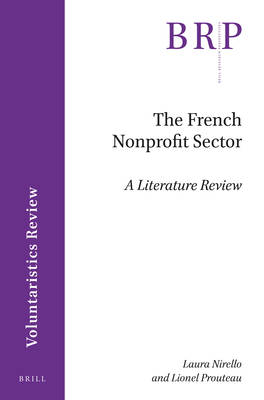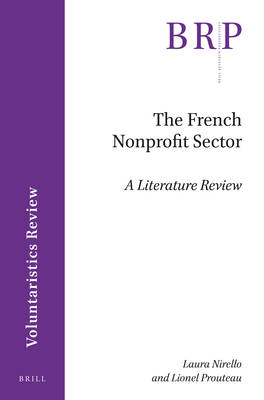
- Afhalen na 1 uur in een winkel met voorraad
- Gratis thuislevering in België vanaf € 30
- Ruim aanbod met 7 miljoen producten
- Afhalen na 1 uur in een winkel met voorraad
- Gratis thuislevering in België vanaf € 30
- Ruim aanbod met 7 miljoen producten
Zoeken
€ 128,45
+ 256 punten
Omschrijving
This article deals with the literature on the French nonprofit sector (NPS). A preliminary part is devoted to presenting and discussing the characteristics that shape the approaches to this sector in France. We stress the strong influence of legal categories on the sector's definition and, in this context, the importance of the status inherited from the 1901 Act on contracts of association. This raises a problem for a more analytical approach to the sector, because the diversity of the nonprofit organizations (NPOs) regulated under this Act risks being overshadowed. In this first part, we also underline the primacy accorded in France to the concept of the social economy, which has today become the social and solidarity economy (SSE), over that of the nonprofit sector.
In the second part, the article outlines some landmarks in the history of the French NPS. French NPOs were for many years objects of suspicion, arbitrariness and repression on the part of the public authorities and this persisted until the 1901 legislation on contracts of association was enacted. However, this hostile context did not prevent the sector from having a richer existence than is sometimes admitted.
This literature review also focuses on empirical studies of the sector, placing a particular emphasis on the more recent ones. These French studies basically adopt two types of approach. The first is concerned essentially with the NPOs and focuses its attention on their economic importance, whether measured in terms of financial resources, employment, or, less frequently, added value. The second approach investigates the kinds of individual participation the sector engenders by examining the various forms it takes, such as membership of NPOs or voluntary work.
This review ends with the analysis of the challenges that NPS faces in a context characterized by the increasing constraints on public funding, changes in the nature of such funding with a substitution of contracts for subsidies, an increased competition among NPOs as well as between NPOs and for-profit enterprises. The article concludes that, despite the advances in research on the French NPS, some aspects--like formal volunteering and the role of voluntary associations--are still understudied, while others--like informal groups and informal volunteering--are almost totally ignored.
In the second part, the article outlines some landmarks in the history of the French NPS. French NPOs were for many years objects of suspicion, arbitrariness and repression on the part of the public authorities and this persisted until the 1901 legislation on contracts of association was enacted. However, this hostile context did not prevent the sector from having a richer existence than is sometimes admitted.
This literature review also focuses on empirical studies of the sector, placing a particular emphasis on the more recent ones. These French studies basically adopt two types of approach. The first is concerned essentially with the NPOs and focuses its attention on their economic importance, whether measured in terms of financial resources, employment, or, less frequently, added value. The second approach investigates the kinds of individual participation the sector engenders by examining the various forms it takes, such as membership of NPOs or voluntary work.
This review ends with the analysis of the challenges that NPS faces in a context characterized by the increasing constraints on public funding, changes in the nature of such funding with a substitution of contracts for subsidies, an increased competition among NPOs as well as between NPOs and for-profit enterprises. The article concludes that, despite the advances in research on the French NPS, some aspects--like formal volunteering and the role of voluntary associations--are still understudied, while others--like informal groups and informal volunteering--are almost totally ignored.
Specificaties
Betrokkenen
- Auteur(s):
- Uitgeverij:
Inhoud
- Aantal bladzijden:
- 94
- Taal:
- Engels
- Reeks:
- Reeksnummer:
- nr. 13
Eigenschappen
- Productcode (EAN):
- 9789004382909
- Verschijningsdatum:
- 19/07/2018
- Uitvoering:
- Paperback
- Formaat:
- Trade paperback (VS)
- Afmetingen:
- 155 mm x 235 mm
- Gewicht:
- 168 g

Alleen bij Standaard Boekhandel
+ 256 punten op je klantenkaart van Standaard Boekhandel
Beoordelingen
We publiceren alleen reviews die voldoen aan de voorwaarden voor reviews. Bekijk onze voorwaarden voor reviews.








